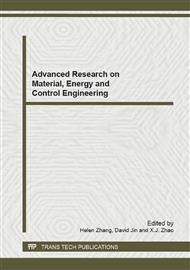p.323
p.328
p.334
p.344
p.348
p.353
p.357
p.361
p.365
Study on Electric Differential Control Scheme for Electric Vehicles
Abstract:
In order to improve control performance of the electric vehicles independent motor driven wheel steering , using the Ackerman angle relation to design electronic differential system of electric vehicles based on DSP2407 . This control strategy considering various pavement condition and slip rate, will be able to realize the electric vehicles in the complex road conditions, and have fast response requirements. Electronic differential controller of electric vehicles based on DSP2407 can deal with between speed of body and Angle of the nonlinear relationship effectively, when steering operation, is about to drive wheel with input different torque, realized the good adaptive differential, and has advantages of good real-time performance and strong robustness etc.
Info:
Periodical:
Pages:
348-352
DOI:
Citation:
Online since:
January 2013
Authors:
Price:
Сopyright:
© 2013 Trans Tech Publications Ltd. All Rights Reserved
Share:
Citation:


